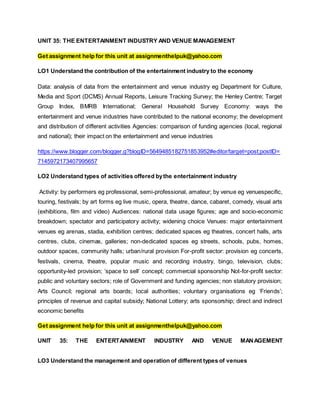Recommended
Recommended
More Related Content
Viewers also liked
Viewers also liked (6)
Personal and professional development plan sample essay

Personal and professional development plan sample essay
Similar to Unit 35
Similar to Unit 35 (20)
Are you keen to know about upcoming trends in Live Event Industry

Are you keen to know about upcoming trends in Live Event Industry
LONU046 International Hospitality And Tourism Management.docx

LONU046 International Hospitality And Tourism Management.docx
Factors affect real estate prices by jimmy stepanian

Factors affect real estate prices by jimmy stepanian
Introduction With the world cups transforming into a reserved.pdf

Introduction With the world cups transforming into a reserved.pdf
More from Premium Assignment Help
More from Premium Assignment Help (20)
UNIT 26: PLANNING AND MANAGING FOOD PRODUCTION AND BEVERAGE SERVICE

UNIT 26: PLANNING AND MANAGING FOOD PRODUCTION AND BEVERAGE SERVICE
UNIT 9: HUMAN RESOURCE MANAGEMENT FOR SERVICE INDUSTRIES

UNIT 9: HUMAN RESOURCE MANAGEMENT FOR SERVICE INDUSTRIES
Unit 35
- 1. UNIT 35: THE ENTERTAINMENT INDUSTRY AND VENUE MANAGEMENT Get assignment help for this unit at assignmenthelpuk@yahoo.com LO1 Understand the contribution of the entertainment industry to the economy Data: analysis of data from the entertainment and venue industry eg Department for Culture, Media and Sport (DCMS) Annual Reports, Leisure Tracking Survey; the Henley Centre; Target Group Index, BMRB International; General Household Survey Economy: ways the entertainment and venue industries have contributed to the national economy; the development and distribution of different activities Agencies: comparison of funding agencies (local, regional and national); their impact on the entertainment and venue industries https://www.blogger.com/blogger.g?blogID=5649485182751853952#editor/target=post;postID= 7145972173407995657 LO2 Understand types of activities offered bythe entertainment industry Activity: by performers eg professional, semi-professional, amateur; by venue eg venuespecific, touring, festivals; by art forms eg live music, opera, theatre, dance, cabaret, comedy, visual arts (exhibitions, film and video) Audiences: national data usage figures; age and socio-economic breakdown; spectator and participatory activity; widening choice Venues: major entertainment venues eg arenas, stadia, exhibition centres; dedicated spaces eg theatres, concert halls, arts centres, clubs, cinemas, galleries; non-dedicated spaces eg streets, schools, pubs, homes, outdoor spaces, community halls; urban/rural provision For-profit sector: provision eg concerts, festivals, cinema, theatre, popular music and recording industry, bingo, television, clubs; opportunity-led provision; ‘space to sell’ concept; commercial sponsorship Not-for-profit sector: public and voluntary sectors; role of Government and funding agencies; non statutory provision; Arts Council; regional arts boards; local authorities; voluntary organisations eg ‘Friends’; principles of revenue and capital subsidy; National Lottery; arts sponsorship; direct and indirect economic benefits Get assignment help for this unit at assignmenthelpuk@yahoo.com UNIT 35: THE ENTERTAINMENT INDUSTRY AND VENUE MANAGEMENT LO3 Understand the management and operation of different types of venues
- 2. Strategies: management and operational strategies of organisations within the industry Income generation: revenue generation and procedures within the industry; front of house operations; box office Influences: status eg for-profit, not-for-profit; direction eg programming, scheduling; administration eg licensing, staffing, budgeting, resource planning Audience and performance needs: health, safety and security; cleaning and maintenance; catering and bars; technical and production staff; performers Marketing needs: publicity; promotion; merchandising and point-of- sale; media relations Employment: managerial and supervisory levels in each sector Staffing: work and responsibilities for selected venues commenting on current practices; deployment of staff to ensure a smooth and effective organization LO4 Understand trends in the entertainment and venue industries Opportunities: current opportunities in the entertainment industry Future trends: trends eg purpose built, multi-purpose facilities, partnership funding, commercial approach to management; cultural provision as part of major international sports events Technological influences: technical; production; new technologies; effect of technological changes UNIT 35: THE ENTERTAINMENT INDUSTRY AND VENUE MANAGEMENT Learning outcomes and assessment criteria Learning outcomes On successful completion of this unit a learner will: LO1 Understand the contribution of the entertainment industry to the economy Assessment criteria for pass https://www.blogger.com/blogger.g?blogID=5649485182751853952#editor/target=post;postID= 7145972173407995657 The learner can: 1.1 analyse the contribution of the entertainment industry to the economy and the development and distribution of different activities
- 3. 1.2 compare local, regional and national funding agencies and their impact on the entertainment and venue industry LO2 Understand types of activities offered by the entertainment industry 2.1 compare the scope of the entertainment and venue industry and the range of activities offered 2.2 classify entertainment activities using audience profiles and venues LO3 Understand the management and operation of different types of venues 3.1 compare management and operational strategies for selected venues, commenting on their revenue generation and procedures 3.2 evaluate different areas of work and responsibilities for selected venues, commenting on current practices, deployment of staff to ensure a smooth and effective organisation Get assignment help for this unit at assignmenthelpuk@yahoo.com LO4 Understand trends in the entertainment and venue industries 4.1 analyse current trends in the entertainment and venue industries 4.2 discuss the effect of current funding arrangements in the entertainment industry and future potential developments 4.3 analyse the impact of technological changes in the management and operation of entertainment activities and venues UNIT 35: THE ENTERTAINMENT INDUSTRY AND VENUE MANAGEMENT Guidance Links This unit links to:Unit 4: Research Project Unit 8: Marketing in Hospitality. Essential requirements
- 4. Learners must be given access to a wide range of publications to reflect the diverse nature of this subject area. Employer engagement and vocational contexts Employer engagement should be encouraged. Presentations and talks from the industry, including event managers should be included in this unit. Get assignment help for this unit at assignmenthelpuk@yahoo.com

